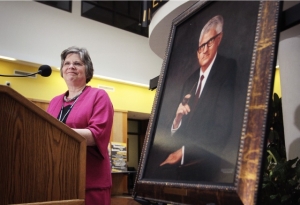Duplin man honored for work with colleges
By Phyllis Moore
Published in News on March 7, 2013 1:46 PM

News-Argus/MICHAEL BETTS
Wayne Community College Vice President Dr. Peggy Teague talks about Dr. Dallas Herring during the unveiling of Herring's portrait. Herring, a Duplin County native, was recognized for his impact on the community college system and community colleges across the state.
A Duplin County native with a passion for learning and credited with being the founder of the N.C. community college system, was memorialized Wednesday at Wayne Community College and the state's other 57 institutions.
Commissioned portraits of Dr. W. Dallas Herring were unveiled as part of the state community college system's 50th anniversary.
Born in Rose Hill in 1916, at 23 he became the town's mayor and the youngest mayor in the country. In 1957, he was appointed by then-Gov. Luther Hodges as chairman of the state Board of Education. That same year, the General Assembly adopted the first Community College Act, establishing junior colleges in the state.
The General Assembly, in 1963, established the N.C. Community College System, bringing together 20 industrial education centers, six junior colleges and five extension units.
During his 20-year tenure as chairman of the state board, Herring's accomplishments included making improvement to curriculum, class size, salaries, teachers' aides programs and kindergarten.
He died in 2007, at the age of 90.
Dr. Herman Porter, a former president of Wayne Community College, praised Herring for being "among the very top in the top 21st century in leadership."
"He was a confident man, at 5 foot 7 inches; he smoked a pipe, wore a bow tie; he looked like somebody," he said. "He was somebody and you could see it, the way he carried himself, the way he spoke.
"He gave good speeches, he did his homework."
Another former WCC president, Dr. Ed Wilson also had fond memories of Herring, who called him "Young Ed" during the days when Wilson's father worked at the community college system office.
"Every president, before they became a president, had to go down and sit on (Herring's) porch and talk to him," he said with a smile.
Despite a 50-year age difference, Herring's cousin, Chris Denise, director of academic skills center at WCC, said they also enjoyed many philosophical discussions late into the night at the Tudor-style house Herring designed himself and converted into a genealogical library.
"The entire intent of making his house into a library was to get everyone to visit him, to create an open door," he said. "His house was open to the public and he meant that genuinely and earnestly."
He remembered his cousin's openness, generosity and sincerity, as a man who read the Bible in Greek and had a knack for acting out Greek literature with a dramatic flair. And only later did Denise realize that "the most amazing people would just show up for a visit."
Herring, he added, had a love of education -- learning as well as teaching others.
"He did not see status, race, color, religion," he said. "He absolutely accepted everyone on their terms.
"To me he was an inspiration, very much so."
The portrait of Herring will be on display in the board room of the Dogwood Building at WCC, Dr. Teague said.
"He will continue to live on across our state in 58 colleges in the community college system," she said.
